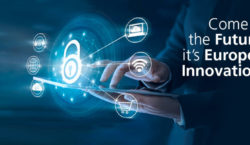On 11 December 2017, the EU’s Foreign Affairs Council adopted conclusions on Thailand, reaffirming the importance the EU attaches to its relations with Thailand. The Council considered it appropriate to pursue gradual political re-engagement with Thailand.
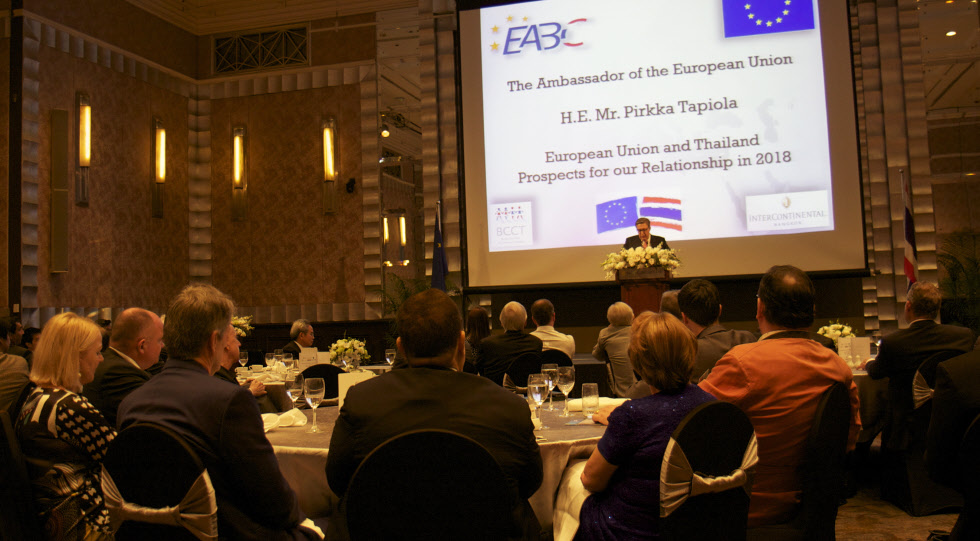
These conclusions could not have been more timely for H.E. Mr Pirkka Tapiola (from Finland), who on the day before, 10 December, had formally had assumed his duties as the Ambassador of the European Union to Thailand.
Later, on 27 March 2018, the European-Thai business community got to learn more details from the EU Ambassador as invited guest speaker at EABC (European Association for Business and Commerce) Multi-Chambers Lunch. Here follows a report with quotes from his speech.
It was an inspired talk, from a seasoned diplomat with previous Thailand experience and someone who places European values in high regard and knows the value of international trade and relationships.
“I came to Bangkok with one goal, one mission, which is re-engagement. First gradually, until the elections, with hopefully a democratically elected government that should open up a number of things. But then hopefully and very importantly, in taking the relationship between the EU and the Kingdom of Thailand to a completely new level,” Pirkka Tapiola began, addressing the European business representatives, the “motors of the EU-Thai relationship”.
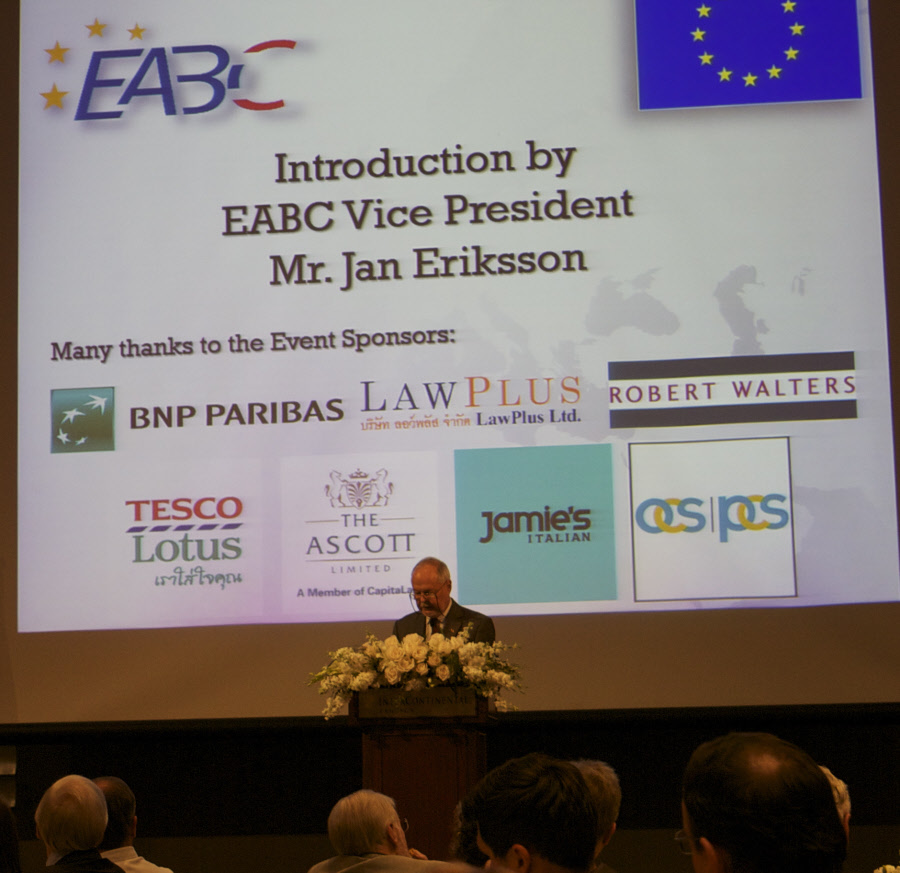
“European business has been present here for a long time. Your footprint is extremely important. You are what brings benefits and profit for the European citizens and you create jobs for Thailand,” Mr Tapiola told them. “We matter; we are an economic super power.”
“After nearly a decade of recession we are now back at the growth track as the European economies, with 2.4 % GDP growth. If you are a tiger economy in Asia, it may sound not that big but for the more established part of the world it is.”
Commenting on the economic relationship with Thailand he said: “We are the third largest trading partner, the third export destination, the third source of FDI. Ten per cent of Thailand’s trade with the world is with the European Union. That’s a lot. The EU is the second investment destination abroad for Thais. These are very big numbers. But this didn’t happen overnight.”
Mr Tapiola pointed to that the origins of the EU-Thailand relationship goes back many centuries and said: “This is going to be a very important year, because while I represent Europe as a whole at the same time you also Europe has been born out of states that has come together. And this year we are celebrating 500 years of the first treaty between Portugal and Thailand.”
Last time around Mr Tapiola arrived to Bangkok was in 1998, which he now compared with: “I see a lot more wealth, I see a middle class which is thriving, I see traffic that is by the way much better, and I do see dynamism. That really shows how Thailand has come forward and it also shows why it’s so important for us as Europeans to have a close relationship with Thailand. We really need to underline the strategic importance of this country in the Asean context and EU-Asean context.”
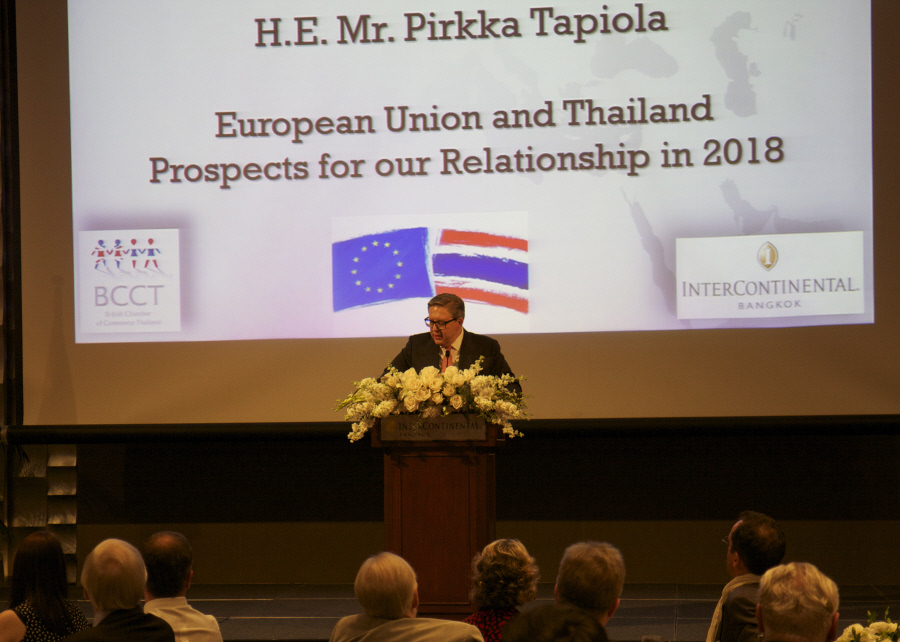
“Thailand is a country the size of France, right in the middle of Southeast Asia. It was never colonised, it’s proud, and extremely important. We need to be here and to work very closely – it’s the kind partner that we want to have. We need to look at our expectations mutually on government and other issues.”
Aside the EU being back to strong growth, the EU Ambassador also pointed out that many ways in which the EU has changed makes this a very good moment to start the re-engagement with Thailand.
“We’re not an economic block anymore, not a free trade area, not even a single market. We are the European Union, since the Treaty of Maastricht and since nearly ten years we have had in place the Lisbon treaty. We had a delegation here since 1978-1979 but in fact that was a representation of the European Commission until 2010 – 2011. And then we became the delegation of the European Union. We no longer have a rotating Presidency of foreign affairs; we have the High Representative, and a network of 140 embassies or EU delegations, with fully-fledged ambassadors running them all around the world. We have closer military cooperation. We have enormous amount of crisis management and military missions around the world. We have a President of the European Council chairing the meetings of the EU heads of state.”
“So, a lot has happened and that means that the EU has changed. And this also plays into this relationship.”
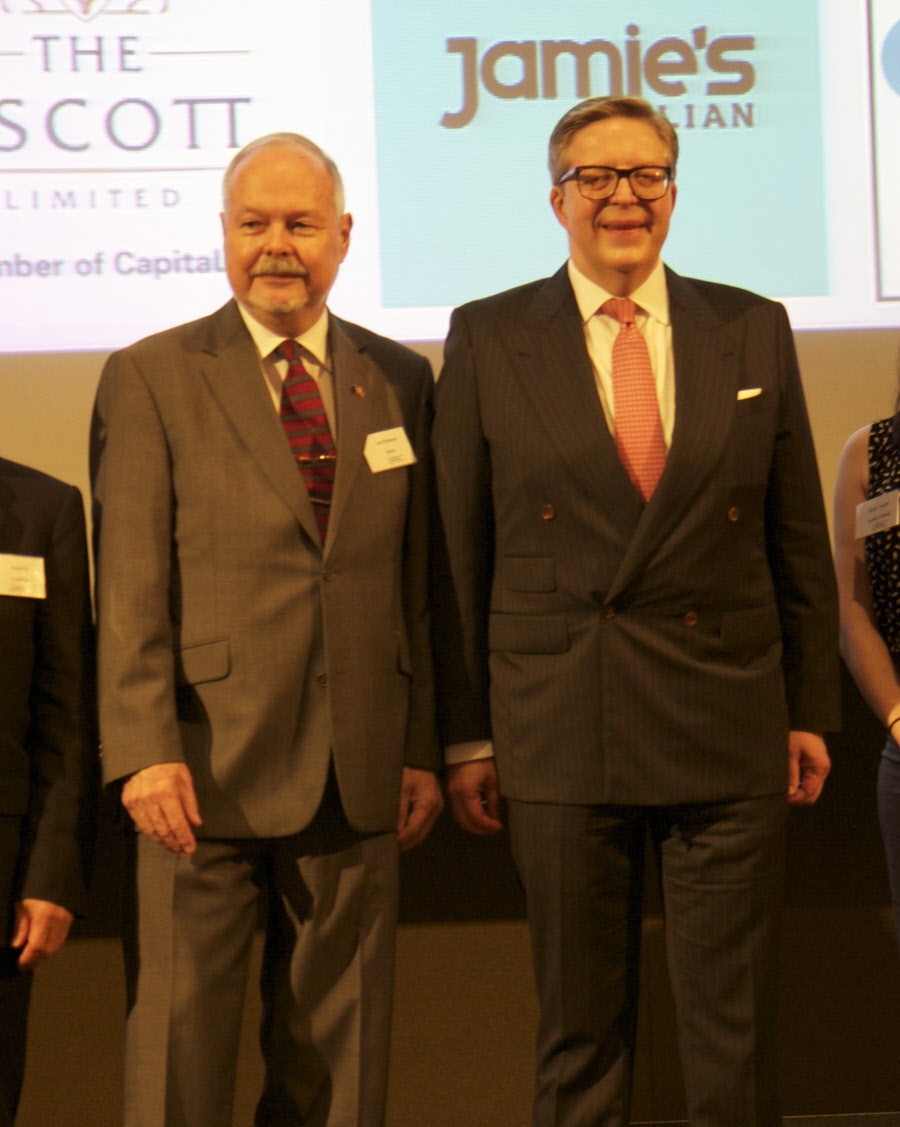
“Here we are going towards – hopefully – a new beginning. When we agreed on the prospects for 2018 we were of course looking very much at the prospects of elections in November 2018. I am not at liberty to say that the date of the election doesn’t matter. You saw a big important compromise happening late last year in that we in fact managed to rally our 28 member states to not change policy but to change tactics in our relations with the Kingdom of Thailand.”
The EU had looked at the development in the country, said its Thailand ambassador.
“We had a new constitution last year and took note of that. We saw that criminal cases were moving from military to civilian courts and we heard talk about an election in November. So we thought that ‘OK, we are getting there’. And Thailand is important; we want to have that relationship. So we opened up, we established political level contacts at all levels, and also discussed the issues, because I think that we realise that in order to support Thailand on her way to restoration of democratic governance, it was better that we talk , better that we met and have those conversations.”
“A lot has happened; there’s a new customs code, new procurement legislation – all very good things.
“The other element that was extremely important is that we had, when the military took over, already started negotiating a free trade agreement with Thailand. We believe in free trade, we don’t believe in protectionism. At this the time in world history being there for free trade is more important than ever before. Because protectionism and nationalist tendencies are there – we know that openness in economies brings successes. We want a free trade agreement with Asean eventually but we are working now with Asean member states,” continued Mr Tapiola.
“For very good reasons we realise that we cannot re-start those negotiations without a democratically elected government. But we did want to send a very strong message: to our partners and friends in the Royal Thai government: Let’s prepare. It is four years since we stopped those negotiations. Let’s talk on technical level. We can talk to each other; we’d be crazy not to.”
“So we are putting in place those building blocks, so that when we are moving towards the right conditions that we can rather than look for the wiring in the wall go somewhere closer to a light switch and say: ‘O.K, now we can do this and this.’ Because Thailand matters.”
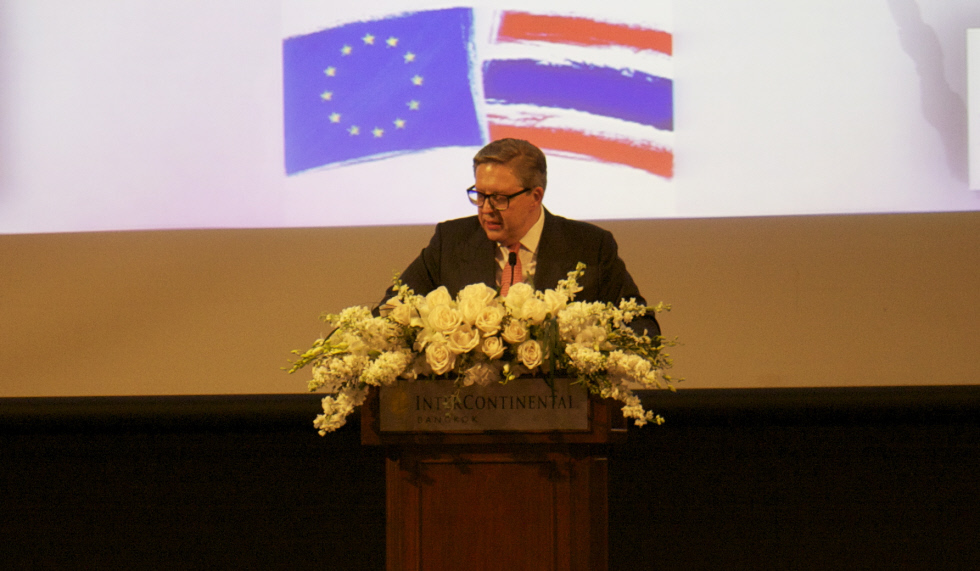
“This is where we are heading, and I’m optimistic. But yes, we do need elections, no I am not getting involved in internal affairs of the country but if you read those council conclusions you know that internal affairs do matter and domestic developments do matter for us.”
“I’m a representative of 28 member states and the European Commission at the same time but I also want to be your representative; of European business and trade interests. We have something called EU Global Strategy about our interests, our values and resilience. So being here as the EU delegation we work for you on the policy level. And that is not to take anything away from your national embassies, this is to complement; the glue that puts us all together. What I really want to see is that this format, the EABC, the strong European business voice, gets strengthened in Thailand. And I really hope that we can work together on that.”



